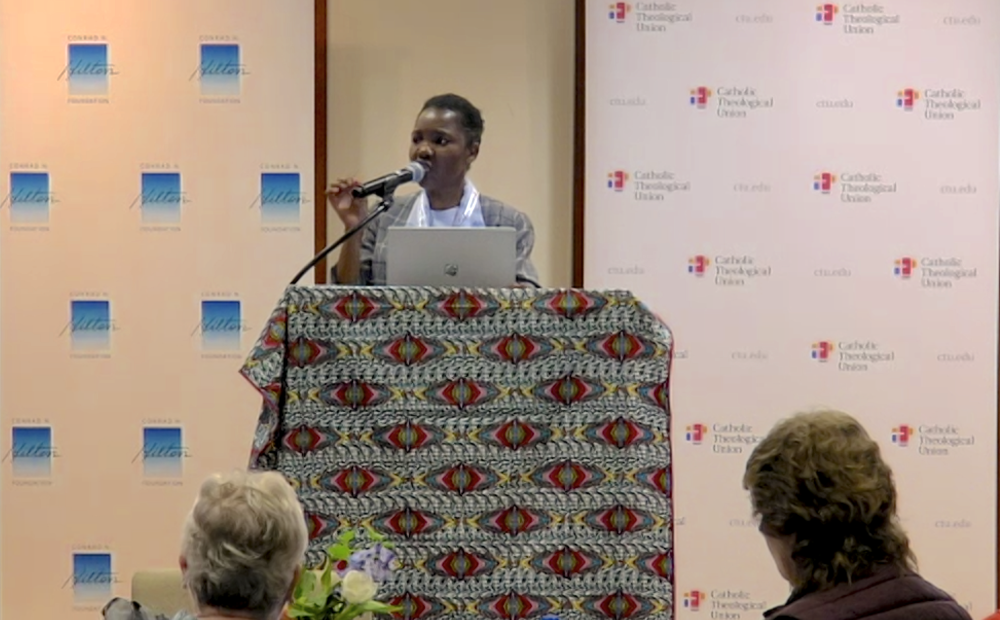
Sr. Limétèze Pierre-Gilles, of the School Sisters of Notre Dame, speaks April 19 at a symposium on women and men religious' role as agents for racial justice at Catholic Theological Union's Center for the Study of Consecrated Life in Chicago. (GSR screenshot)
Untangling the world's — and the Catholic Church's — history of racial injustice is complex, but the answer to the problem is incredibly simple, a sister told a symposium on race April 19.
Sr. Limétèze Pierre-Gilles, of the School Sisters of Notre Dame, told attendees of a symposium on women and men religious' role as agents for racial justice at Catholic Theological Union's Center for the Study of Consecrated Life in Chicago that the answer to racism is simply to follow Jesus' commandment to love your neighbor.
Why whites, Christians, and even Catholics, cannot follow that, she said, is a mystery.
"What part of this instruction didn't they understand?" Pierre-Gilles asked. "We are Christians, which means we don't have a choice. … That's how we're supposed to be recognized — by the way we love each other, by the way we love our neighbors."
'How is it possible that a person can be both Christian and racist at the same time? How is it possible?'
—Sr. Limétèze Pierre-Gilles
On April 18, the first day of the conference, keynote speaker Fr. Bryan Massingale cited the Rev. Martin Luther King Jr.'s assertion that one of the greatest obstacles to racial injustice is the white desire for "low-cost" reconciliation.
"We all want transformation. We all want reconciliation," Massingale said. "But we don't want to pay a high price for it."
Pierre-Gilles echoed that in her remarks when she told of asking a white sister if she had ever prayed to an image of a Black Jesus.
"She said she had, but she found it difficult, so she stopped," Pierre-Gilles said. "But I have been praying to an image of a white Jesus all my life."
Massingale, whose professional passion is advancing a Black approach to Catholic theological ethics, noted that the sacrament of reconciliation requires genuine contrition.
"There has never been genuine sorrow and regret for the treatment of Black people," Massingale said, adding that true conversion is completed by acts of penance.
"White America is unwilling to make the paschal journey to a new identity. … Which is why we find ourselves having to hold symposiums like this."
Pierre-Gilles, who ministers with Beyond Borders, a nonprofit working in her native Haiti, pointed out how much it can mean simply to ask for forgiveness.
"Even if we just take the time to say 'I'm sorry,' … that could help with healing," she said. "When we decide to love with all our hearts, with all our being, that can bring healing not only to other people but to ourselves."
Advertisement
Massingale also spoke about the sanctuary lamp, the candle that burns night and day in front of the tabernacle because it houses the real presence of Jesus Christ.
"Which raises the question: Which bodies have that sanctuary lamp in front of them?" he asked. "The challenge for Catholics is not whether we believe in Christ's real presence in the Eucharist, but whether we believe Christ is really present in Black and brown bodies. And until we can answer that question with an unequivocal yes, our church will never be an agent of transformational justice."
Pierre-Gilles said you cannot believe what the Bible says and hold racist views.
"How is it possible that a person can be both Christian and racist at the same time? How is it possible?" she asked. "In Genesis, God looks at all of his creation and says it is good. … God doesn't lie. If God says you are good, then you are good."
Massingale ended by exhorting religious to take up the fight.
"We need you to be agents of justice," he said. "That is our summons: to create a church where all of us can breathe free."
Pierre-Gilles wrapped up her talk by urging attendees to love as Jesus commanded.
"There is only one solution to this question of racial injustice that we have faced for centuries," she said. "The solution is love. Perhaps one day we can all say with conviction: My vocation is love."








